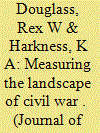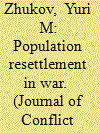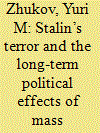| Srl | Item |
| 1 |
ID:
158211


|
|
|
|
|
| Summary/Abstract |
Subnational conflict research increasingly utilizes georeferenced event datasets to understand contentious politics and violence. Yet, how exactly locations are mapped to particular geographies, especially from unstructured text sources such as newspaper reports and archival records, remains opaque and few best practices exist for guiding researchers through the subtle but consequential decisions made during geolocation. We begin to address this gap by developing a systematic approach to georeferencing that articulates the strategies available, empirically diagnoses problems of bias created by both the data generating process and researcher-controlled tasks, and provides new generalizable tools for simultaneously optimizing both the recovery and accuracy of coordinates. We then empirically evaluate our process and tools against new micro-level data on the Mau Mau rebellion (colonial Kenya 1952–60), drawn from 20,000 pages of recently declassified British military intelligence reports. By leveraging a subset of these data that includes map codes alongside natural language location descriptions, we demonstrate how inappropriately georeferencing data can have important downstream consequences in terms of systematically biasing coefficients or altering statistical significance and how our tools can help alleviate these problems.
|
|
|
|
|
|
|
|
|
|
|
|
|
|
|
|
| 2 |
ID:
141704


|
|
|
|
|
| Summary/Abstract |
Why do combatants intentionally uproot civilians? The forcible relocation of families and communities to concentration camps, “protected villages,” and other special settlements is a regular feature of irregular war, occurring in almost a third of all counterinsurgency campaigns since 1816. Despite the historical regularity of these practices, most research has focused on individual decisions to flee, rather than the brute-force resettlement of civilians by combatants. Using a dynamic model of popular support and new micro-level data from Soviet secret police archives, I show that civilian resettlement is not simply a by-product of war but is a rational response to informational asymmetry. Combatants who cannot identify and selectively punish their opponents face incentives to control the population rather than earn its support. For strong governments with limited coercive leverage, civilian resettlement offers a way to reduce rebel activity without having to win hearts and minds.
|
|
|
|
|
|
|
|
|
|
|
|
|
|
|
|
| 3 |
ID:
158216


|
|
|
|
|
| Summary/Abstract |
Repression has a long-term negative effect on political participation. Using millions of arrest records from archival documents, and polling station-level election results, we examine how exposure to Stalin-era repression affects voter turnout in Putin’s Russia. To estimate the effect of repression on voting, we exploit exogenous variation in repression due to the structure of mid-century Soviet railroads, and travel distances to prison camps. We find that communities more heavily repressed under Stalin are less likely to vote today. The electoral legacy of Stalin’s terror – decades after the Soviet collapse, and across multiple election cycles (2003–12) – is systematically lower turnout. To show that our result is not unique to the Putin regime, we replicate our analysis in Ukraine (2004–14), and find similar patterns. These results highlight the negative consequences of repression for political behavior, and challenge the emerging view that exposure to violence increases political engagement. While past research has emphasized the short-term effects of repression over several months or years, we show that these effects may be durable over generations and even changes of political regime. Our findings also demonstrate that repression need not be collective or indiscriminate to have community-level effects.
|
|
|
|
|
|
|
|
|
|
|
|
|
|
|
|